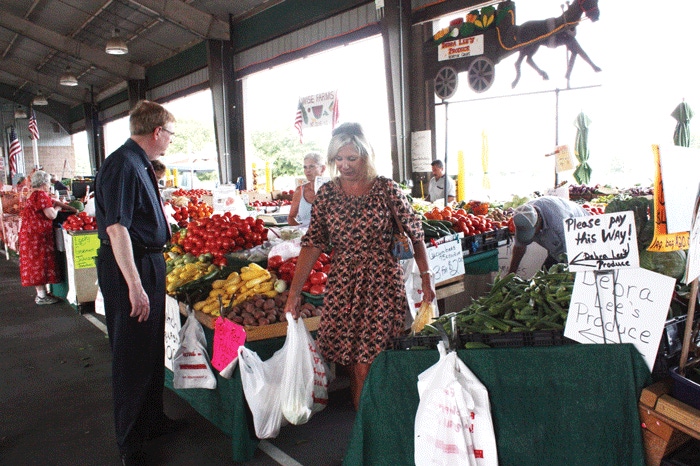August 27, 2012

Greg Hyman learned a lesson about direct marketing farm products in the last few years: If the consumer won't come to you, you'd better go to the consumer.
Hyman has a muscadine vineyard near Conway, S.C., and he tried for several years to sell value-added products at a farm store, along with agritourism activities like weddings and special events.
There was one major problem: a shortage of customers.
“The location is just too remote, and we weren't getting a lot of traffic,” said Hyman. “Our efforts to bring people just weren't getting the job done.”
So he took a bold step three years ago — he decided to start selling some of his products at the Pee Dee state farmers market in Florence, about 50 miles away. He obtained a stand in the farmers' area and had immediate success, selling both fruit and wine, but also value-added products.
It is a long commute, but Hyman said it's worth it. “We have to drive an hour each way, and there is a definite cost to doing that,” he said. “There are other increased costs too. But we feel we more than offset it by the increased customer traffic that has led to increased business.”
The farmers market — halfway between Florence and Darlington — is situated on one major traffic artery, U.S. Hwy. 52, and is one and half miles from Interstate-95 and three miles from Interstate-20.
Having that much vehicular traffic predisposes the market to heavy foot traffic, and Hyman said that really contrasts with the shortage of visitors he had back in Conway.
Muscadine growers have learned another lesson in recent years: Don't assume a by-product has no value.
When muscadine grapes are pressed for juice to make wine, the residue of skin, pulp, and seedsthat is left over is called pomace.
Traditionally, pomace has been considered a waste product that had to be disposed of.
It accounts for most of the fruit, and for all practical purposes, it had no value.
But that has changed. In what has to be an inspiration to any farmers trying to make a go of it in the Southern fruit and vegetable industry, the pendulum for pomace has swung in the other direction.
Thanks to some imaginative manufacturers, a number of exciting new products have emerged in recent years that have turned pomace into a product that adds value above and beyond the juice of the grape itself.
MotherVine Neutraceuticals in Manteo, N.C., is one of those companies. It started with a 100 percent whole grape dietary supplement, made by grinding the pomace into a fine powder and inserting it in a vegetarian capsule.
Unique marketing approach
MotherVine has successfully portrayed the supplement as yielding all the preventative and restorative health benefits that consumers seek from products of this nature, without the unknowns of supplements that aren’t all natural. A promising new market has been developed.
Since the introduction of the supplement, MotherVine and other companies have introduced many new neutraceutical products using muscadines.
Muscadine grapes are powerful health foods because of the diverse and complex phytochemicals found in the whole grape, said Amy Odom, president of MotherVine.“Resveratrol is just one of the many nutrients found in muscadines, which are anti-bacterial, anti-fungal, anti-UV radiation, anti-inflammatory and anti-cancer," she said.
MotherVine also includes honey and blueberries in some of its products. And it now also sells jams and jellies, juices and soaps, among many other things.
More are coming. Odom is particularly optimistic about skin care products based on the muscadine. “We plan soon on having a non-toxic sunscreen,” she said. “Along with creams and soaps, it should promote healing and healthfulness of the skin.”
MotherVine gets both its name and — indirectly — its raw product from the centuries-old vineyard on Roanoke Island.
The Mother Vine, thought to be the nation's oldest cultivated vine, grows from the sandy soil in sight of Roanoke Sound in several thick clusters of woody roots. The trellising covers an area 32 feet wide and 120 feet long.
The vine is privately owned and the owners make personal use of the grapes they harvest from it.
But in 2004, with the permission of the private owners, clippings were taken directly from the vine and used to establish The MotherVine Vineyard near Rose Hill, N.C. Operated by Duplin Winery, this vineyard is the primary source of MotherVine's grapes.
Steve Drew, executive vice-president of MotherVine pointed out an irony about the growth of the muscadine industry in North Carolina. It has taken place at more or less the same time as tobacco has declined after federal deregulation in 2004.
“As growers look to take advantage of the land that has been freed up from tobacco, they have frequently found that muscadines are a good substitute for tobacco on land that has been in tobacco for a long time,” Drew said. “In other words, a crop with a problem related to health is being replaced by perhaps the healthiest agricultural crop there is!”
You May Also Like




